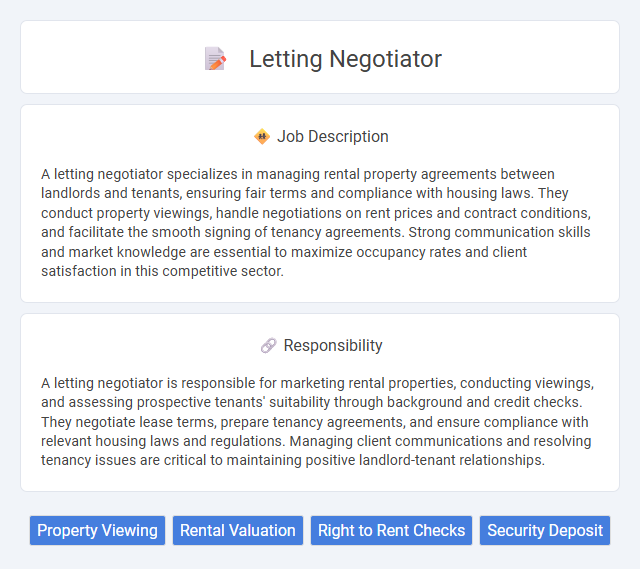
A letting negotiator specializes in managing rental property agreements between landlords and tenants, ensuring fair terms and compliance with housing laws. They conduct property viewings, handle negotiations on rent prices and contract conditions, and facilitate the smooth signing of tenancy agreements. Strong communication skills and market knowledge are essential to maximize occupancy rates and client satisfaction in this competitive sector.
Individuals with strong interpersonal skills and a calm demeanor may likely be suitable for a letting negotiator role, as the job often requires managing client expectations and resolving conflicts. Those who handle pressure well and possess good negotiation abilities could find the role manageable and rewarding. Conversely, people prone to stress or who struggle with communication might face challenges in this position.
Qualification
A Letting Negotiator must possess excellent communication and negotiation skills to effectively manage client relationships and secure rental agreements. Proficiency in property management software, knowledge of tenancy laws, and strong organizational abilities are essential for handling contracts and arranging property viewings. Relevant qualifications often include a background in real estate, customer service experience, or certifications in property management such as the National Federation of Property Professionals (NFoPP).
Responsibility
A letting negotiator is responsible for marketing rental properties, conducting viewings, and assessing prospective tenants' suitability through background and credit checks. They negotiate lease terms, prepare tenancy agreements, and ensure compliance with relevant housing laws and regulations. Managing client communications and resolving tenancy issues are critical to maintaining positive landlord-tenant relationships.
Benefit
Letting negotiators likely improve rental processes by efficiently matching landlords with reliable tenants, reducing vacancies and ensuring steady income. Their expertise may minimize disputes and streamline contract terms, increasing satisfaction for both parties. Employing a letting negotiator could enhance overall property management by saving time and mitigating risks associated with tenant selection.
Challenge
Letting negotiator roles likely present significant challenges due to the need to balance landlord and tenant interests effectively. Navigating complex rental agreements and resolving disputes may require strong communication and problem-solving skills. High demand for negotiation expertise suggests ongoing pressure to secure favorable and compliant leasing terms.
Career Advancement
A letting negotiator role offers significant career advancement opportunities through developing expertise in property management, tenant relations, and contract negotiations. Success in this position often leads to promotion into senior roles such as lettings manager or property manager, where strategic decision-making and leadership skills are essential. Mastery of market trends and strong communication abilities enhance prospects for growth within real estate agencies and property firms.
Key Terms
Property Viewing
Property viewing is a pivotal responsibility for a letting negotiator, requiring thorough knowledge of rental properties to effectively showcase features and amenities to prospective tenants. Skilled negotiators arrange and conduct viewings, highlight key benefits, and address tenant queries to facilitate informed decisions. Accurate property presentations and professional communication during viewings significantly enhance tenant engagement and increase lettings success rates.
Rental Valuation
Rental valuation is a critical responsibility for letting negotiators, ensuring accurate market-based pricing of properties to attract suitable tenants and maximize landlord returns. By analyzing local market trends, property condition, and comparable rental data, they provide precise valuations that align with current demand and rental yields. Expertise in rental valuation directly impacts occupancy rates and long-term profitability within the lettings sector.
Right to Rent Checks
Letting negotiators conduct Right to Rent checks to ensure tenants have legal authorization to reside in the property, complying with UK immigration laws. They verify original documents such as passports or biometric residence permits, keeping accurate records of the checks conducted. This process prevents illegal occupation, avoiding penalties and maintaining property management compliance.
Security Deposit
Letting negotiators play a crucial role in managing security deposits, ensuring compliance with tenancy agreements and local regulations. They accurately calculate the deposit amount, typically equivalent to four to six weeks' rent, and oversee its secure handling through government-approved tenancy deposit schemes. Effective management of security deposits minimizes disputes at tenancy end and protects both landlords' interests and tenants' rights.
 kuljobs.com
kuljobs.com